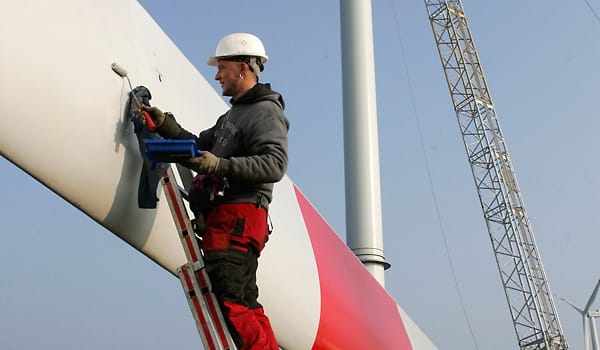Renewable energy jobs not being created as hoped


Renewable energy projects, plus research and development, were supposed to be major powerhouses in creating a new economy. Many hoped this could propel states like California and Nevada out of recession. Surely, if massive wind and solar farms were built, this would create hundreds of thousands of new jobs, or so they thought.
Many big renewable energy projects are already under construction. More are planned. They can be mammoth, sprawling projects covering thousands of acres. But the job creation hasn't been what cleantech boosters thought it would. Quite the opposite actually, it's really been more like a blip. For example, Nevada has over 60 renewable energy projects and is a leader in solar power production. Senate Majority Leader Harry Reid has worked long and hard to bring renewable energy to Nevada. In fact, his own Nevada home has solar and wind power. But even with him pushing it hard, clean energy accounts for just 1.2% of jobs in Las Vegas (and 2% nationally.)
California Governor Jerry Brown and his predecessor Arnold Schwarzenegger are similar tireless boosters for a cleantech economy. But as with Nevada, job creation from cleantech in California has been miniscule. One problem is that construction jobs tend to be in rural areas and in sweltering deserts. This does tend to cut down on the number of those applying for jobs. Plus, once the construction is done, most of the jobs go away. Sure, it may take a few thousand to build a big solar farm, but once it's done, it can probably be maintained by 50-100 employees. So, there are some new jobs. But this is hardly a massive jobs-creating dynamo; instead, it's more like temporary spikes with no long-term lasting employment except for a few.
There are further complications. Vice President Joe Biden and Energy Secretary Steven Chu spoke at the National Clean Energy Summit in Las Vegas last week and said that renewable energy in US now faces serious short-term problems. Chief among them are that stimulus package dollars are ending and existing funding and tax credits could be cut. Most if not all grid-scale renewable energy projects depend on some type of government funding, whether it be loan guarantees, tax credits, or grants. But Republicans are targeting such funding, and without it, new projects may have trouble getting started. The Solyndra bankruptcy last Wednesday will only accelerate this process. That high profile company received over $500 million in loan guarantees from the federal government, and now the money is gone and they are in Chapter 11.
Quoting from National Journal:
"This claim was false from the beginning. The claim that you were going to get lots of cost-effective, viable jobs with the green energy revolution was always highly suspicious," said David Victor, an expert on energy policy and co-director of the Laboratory on International Law and Regulation at the University of California, San Diego. "For now, the industry's dependent on subsidies, and if the subsidies go, the jobs go."
So, there aren't that many cleantech jobs to begin with, existing jobs are tied to government support, and that support may be withdrawn.
All this cannot help but become political, especially given that the 2012 election campaigns will be here soon. A renewable energy future will take years, if not decades to create. We are in a nasty recession and people need jobs now. That's the problem facing renewable energy and its funding by the government.


